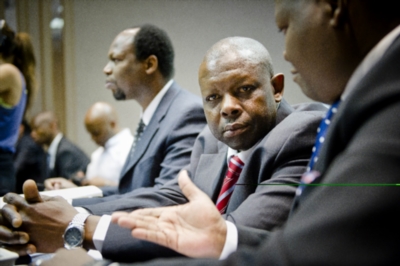He accuses her of gross misconduct for allegedly making false allegations against another judge, leaking it to the public and filing false charges with the Judicial Service Commission.

Western Cape High Court Judge President John Hlophe has filed his own complaint against his deputy Judge Patricia Goliath, charging that the allegations she has raised against him create a “false and unfortunate impression” that he abuses his judicial position.
In his own complaint against Goliath, Hlophe says the allegations levelled against him by his deputy collectively create the false impression that he is corrupt, and that he conducts himself in a manner not befitting the position of a judge.
He accuses her of gross misconduct for allegedly making false allegations against another judge, leaking it to the public and filing false charges against a judicial officer with the Judicial Service Commission.
According to his 31-page affidavit, Deputy Judge President Goliath contravened eight articles of the Code of Conduct for Judicial Officers.
“Much of the complaint is a standard and personal workplace grievance, not a matter of true public and objective concern, and a complaint of poor performance, neither of which is appropriate to this forum,” his papers read.
“What is striking about this 74-paragraph affidavit, is that its golden thread and central theme throughout is, in essence, Goliath’s thesis that I have treated her with insufficient respect for what she considers befits her particular station as Deputy Judge-President.
“This includes, importantly… that Goliath’s complaint is, in substance, driven by the personal affront to her dignity arising from the lack of duties to which she considers she is entitled as DJP (rather than any objective constitutional entitlement).”
Hlophe’s complaint to the JSC filed on Friday comes just over three weeks after Goliath wrote a scathing affidavit accusing Hlophe and his wife, Judge Gayaat Salie-Hlophe, of gross misconduct.
Preferential treatment for his wife, assaulting and verbally abusing two judges and attempting to influence the appointment of judges perceived as “favourably disposed” to former president Jacob Zuma to preside over the so-called Earthlife Africa case involving the nuclear deal, were among the claims contained in the document.
According to Goliath’s complaint, Salie-Hlophe wielded enormous power, including determining her own working days and hours, as well as having major clout in the appointment of acting judges.
Hlophe, in turn, sent the JCC a responding affidavit, rebutting each paragraph of her complaint. This is separate from the counter-complaint he has now laid.
In the complaint, he argues the claims were based on false allegations or allegations that do not meet the constitutional standard for judicial misconduct.
Hlophe pointed out that during Goliath’s interview with the JSC for a Constitutional Court judicial post in April last year, she “interestingly” made no mention of her claims, but referred to the “good relationship” she had with him and the support he gave her, his affidavit said.
She had twice also referred to the division being a “well-oiled machine”, he argued.
“During the course of the interview she confirmed that she had sat on and delivered a verdict in a Judicial Conduct Committee disciplinary matter. This fact merely underlines that she has no excuse for filing such a judicially unbecoming complaint in this forum.”
She “throws every conceivable issue into this complaint, in sweeping terms, often unsupported or scantily supported by any factual detail”, Hlophe countered.
This “shotgun approach” targeted not only him and his wife, he wrote, but also other judges.
“The approach is often complaint by innuendo. It would be self-evident to her that this approach is highly prejudicial in that it assures maximum damage to the judiciary in public opinion, especially for the layman unable to separate the wheat from the chaff, opens up the widest possibilities for the prosecution of this matter, whether meritorious or not, allows a complete fishing expedition to occur down multiple avenues of enquiry and puts me and my legal team to the maximum cost, time and embarrassment in [trying] to cover these multitude of grievances and accusations.
“This is not conduct befitting of a judicial officer.”
Judge President Hlophe also said he believed it was reckless and not in the public interest to question the allocation of the Jason Rhode trial.
Goliath had, in her complaint, said its allocation to Salie-Hlophe by her husband had resulted in unhappiness among her colleagues, as she was one of the most junior judges.
According to Goliath, during discussions with the judge president, she had proposed that the high-profile Susan Rohde murder trial be allocated to Judge Andre le Grange, a relatively senior judge and experienced criminal lawyer.
Hlophe had disagreed with her suggestion, indicating he needed time to consider the allocation, she stated.
He later, that same day, had allocated the case to Salie-Hlophe.
Hlophe countered that every permanent judge has been through a JSC selection process and should be competent to hear any matter.
He said it was implied that Salie-Hlophe was not competent to run the trial.
“This allows a damaging debate to develop in the public sphere that certain judges are not equipped to run such trials, that justice is a manipulated lottery depending on your judge and throws into question, ultimately, the value of JSC selections.
“This is not the debate a responsible judge kindles in respect of a live matter, where parties may seek to use this as ammunition to attack a verdict on grounds other than the merits or merely to score points against the judiciary in the media space.”
Salie-Hlophe found Rohde, a property tycoon, guilty of murdering his wife Susan and staging her suicide at a hotel at the Spier wine estate in Stellenbosch three years ago. He was sentenced to an effective 20 years in prison.
He has, however, maintained his innocence.
Rohde has been granted R200,000 bail while he waits to appeal his sentence in the Supreme Court of Appeal.
The secretariat of the JCC on Wednesday confirmed that Deputy Chief Justice Raymond Zondo had referred the two complaints to the JCC, which will consider whether it should recommend to the JSC that the complaints be investigated and reported on by a Tribunal.
Zondo was reportedly satisfied that each one of the two complaints, if established, would be likely to lead to a finding that the respondent judge in each complaint was guilty of gross misconduct.
For more news your way, download The Citizen’s app for iOS and Android.
Support Local Journalism
Add The Citizen as a Preferred Source on Google and follow us on Google News to see more of our trusted reporting in Google News and Top Stories.








